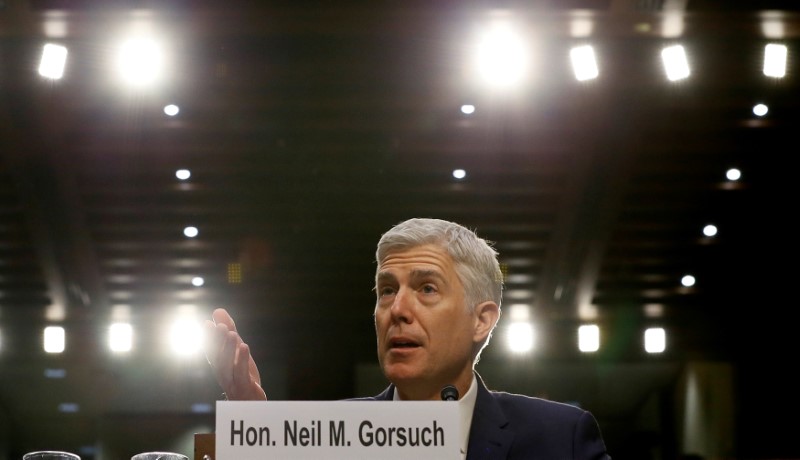By Lawrence Hurley
WASHINGTON (Reuters) - Senate Democrats on Friday stepped closer to having enough votes to block a confirmation vote on President Donald Trump's Supreme Court nominee with three more Democratic senators coming out against Neil Gorsuch for the lifetime job as a justice.
Democrats are attempting use a procedural hurdle called a filibuster that requires 60 votes to allow a confirmation vote in the 100-seat U.S. Senate. Senate Republicans are hoping to vote on April 7 to confirm the conservative appeals court judge nominated by the Republican president in January.
Democratic Senators Claire McCaskill of Missouri, Richard Blumenthal of Connecticut and Brian Schatz of Hawaii came out against Gorsuch on Friday and backed a filibuster.
Republicans control the Senate 52-48. But if Democrats can muster 41 votes, they would be able to sustain the filibuster. As of Friday afternoon, 36 Democrats had indicated their support for such a move. Two Democrats have said they support Gorsuch. Another two have voiced opposition to Gorsuch but have not made clear whether they would support a filibuster to block a confirmation vote.
Seven Democrats and one independent, Angus King of Maine, who usually votes with them, have not yet announced their position.
If Democrats amass enough support to block a confirmation vote, it would force Republican Senate leaders to try to change the chamber's long-standing rules and allow confirmation by a simple majority, a move backed by Trump that is sometimes called the "nuclear option."
If confirmed by the Senate to fill a vacancy created by the February 2016 death of conservative Justice Antonin Scalia, Gorsuch would reinstate the nine-seat high court's conservative majority at a time when Republicans control Congress and the White House.
McCaskill said in a statement she could not support Gorsuch because a study of his legal opinions revealed "a rigid ideology that always puts the little guy under the boot of corporations."
McCaskill is up for re-election next year in a state Trump won in the 2016 presidential election.
Blumenthal, a member of the Judiciary Committee that held a four-day confirmation hearing last week and will vote on sending the nomination to the Senate floor on Monday, said in a statement Gorsuch has not been forthcoming with senators about his views on key issues, leaving his core beliefs little known.
"Instead he has evaded real answers at every turn," Blumenthal said. "We must assume that Judge Gorsuch has passed the Trump litmus test - a pro-life, pro-gun, conservative judge."
Blumenthal said Gorsuch's refusal to "distance himself from right-wing groups" raised questions about whether he may be "an acolyte of hard-right special interests."
Schatz said Gorsuch's record as a judge was troubling and he had not shown he would challenge executive overreach.
"His refusal to answer questions on long-decided cases or condemn attacks on the judiciary during the hearing demonstrates that he is outside of the legal mainstream," Schatz said.
Their statements came one day after Gorsuch won his first Democratic support, giving Republicans who control the chamber two of the eight Democratic votes they need to break a filibuster.
Senators Joe Manchin of West Virginia and Heidi Heitkamp of North Dakota, Democrats who face re-election in states that voted for Trump last year, said they would vote for Gorsuch.
Trump made the appointment of conservative jurists to the Supreme Court a key promise during the 2016 presidential election. Republicans have defended Gorsuch as well qualified to be a Supreme Court justice and praised his performance during the confirmation hearings.
If the filibuster is beaten, the confirmation vote itself would require a simple majority.
Some Democrats have accused Republicans of "stealing" a Supreme Court seat last year when the Senate refused to consider Democratic former President Barack Obama's nominee to replace Scalia, appellate judge Merrick Garland.
